Xuan Thuy Nguyen
 Dr. Xuan Thuy Nguyen is an interdisciplinary researcher, teacher, critical thinker, and community-based learner. She finds gratification in mentoring students from diverse backgrounds, activists, and community-organizers to build decolonial spaces for disability studies and activism within transnational contexts. Her research focuses on the use of participatory arts-based methods to engage women and girls with disabilities in the global South.
Dr. Xuan Thuy Nguyen is an interdisciplinary researcher, teacher, critical thinker, and community-based learner. She finds gratification in mentoring students from diverse backgrounds, activists, and community-organizers to build decolonial spaces for disability studies and activism within transnational contexts. Her research focuses on the use of participatory arts-based methods to engage women and girls with disabilities in the global South.
She is currently the Project Director of a SSHRC’s Partnership Development Project entitled “Learning with and from the global South: Opportunities for engaging girls & young women with disabilities across Southern spaces” (ENGAGE) [2021-2024]. In collaboration with academics, activists, and Disabled People’s Organizations in India, South Africa, and Vietnam, her project examines how young women and girls with disabilities and partners in the global South can engage and build strong leadership as opportunities for decolonial and inclusive knowledge production.
She is also the Principal Investigator of a collaborative research project, Transforming Disability Knowledge, Research, and Activism, (TDKRA) [2016-20] and a co-investigator of a Partnership Project, entitled Engendering Disability-Inclusive Development (EDID) [2020-27]. She most recently received an International Research SEED Grant (IRSG), “Towards inclusive, collaborative, and decolonial relationships with the global South: Lessons learned from a global North/South partnership project” [2021-2023] to support collaborative, decolonial, and sustainable partnership projects. Her work has been published in many peer-review journals such as Disability & Society, Disability and the Global South, Global Studies of Childhood, Foucault Studies, and Girlhood Studies: An Interdisciplinary Journal. She is author of The Journey to Inclusion (2015, Sense/Brill Publishers).
Email: XuanThuyNguyen@cunet.carleton.ca
Nandini Ghosh
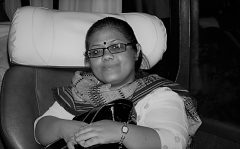 Nandini Ghosh is Assistant Professor of Sociology at Institute of Development Studies Kolkata. After completing Bachelor’s in Sociology from Presidency College Kolkata and Masters from Calcutta University, she got her PhD degree in Social Sciences from the Tata Institute of Social Sciences Mumbai in 2008. Her areas of interest are qualitative research methodology, sociology of gender, marginalization and social exclusion and social movements. She has published a monograph Impaired Bodies Gendered Lives: Everyday Realities of Disabled Women (Primus Books 2016). She has edited a volume titled Interrogating Disability in India: Theory and Practice (Springer 2016).
Nandini Ghosh is Assistant Professor of Sociology at Institute of Development Studies Kolkata. After completing Bachelor’s in Sociology from Presidency College Kolkata and Masters from Calcutta University, she got her PhD degree in Social Sciences from the Tata Institute of Social Sciences Mumbai in 2008. Her areas of interest are qualitative research methodology, sociology of gender, marginalization and social exclusion and social movements. She has published a monograph Impaired Bodies Gendered Lives: Everyday Realities of Disabled Women (Primus Books 2016). She has edited a volume titled Interrogating Disability in India: Theory and Practice (Springer 2016).
She also has co-edited two books a) Pratyaha Everyday Lifeworlds: Dilemmas, Contestations and Negotiations (Primus 2015) and b) Caste and Gender in Contemporary India: Power, Privilege and Politics (Routledge 2018). Her other publications include Bhalo Meye: Cultural Construction of Gender and Disability in Bengal in Renu Adlakha (ed) Disability Studies in India: Global Discourses, Local Realities (Routledge India. 2013); Sites of oppression: dominant ideologies and women with disabilities in India in Tom Shakespeare (ed) The Disability Research Reader: New Voices (Routledge UK. 2015) and Processes of Shaming: The Limits of Disability Policy in India in Zoya Hasan, Aziz Z Huq, Martha Nussbaum and Vidhu Verma (Eds) The Empire of Disgust: Prejudice, Discrimination and Policy in India and the US (2018). She has also co-authored a chapter titled Girls with Disabilities in India: Living Contradictions of Care and Negation published in India Social Development Report 2016: Disability Rights Perspectives (OUP 2016).
Email: nandinighosh@gmail.com
Deborah Stienstra
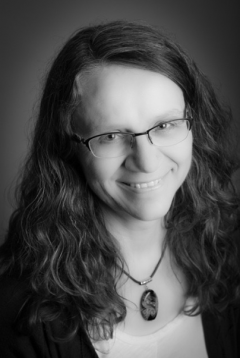 Deborah Stienstra holds the Jarislowsky Chair in Families and Work at the University of Guelph, where she is the Director of the Live Work Well Research Centre and Professor of Political Science. She is the author of About Canada: Disability Rights (Fernwood, 2020). Her research and publications explore the intersections of disabilities, gender, childhood, and Indigenousness, identifying barriers to, as well as possibilities for, engagement and transformative change. Her work also contributes to comparative and trans/international research and theory related to intersectional disability rights and justice.
Deborah Stienstra holds the Jarislowsky Chair in Families and Work at the University of Guelph, where she is the Director of the Live Work Well Research Centre and Professor of Political Science. She is the author of About Canada: Disability Rights (Fernwood, 2020). Her research and publications explore the intersections of disabilities, gender, childhood, and Indigenousness, identifying barriers to, as well as possibilities for, engagement and transformative change. Her work also contributes to comparative and trans/international research and theory related to intersectional disability rights and justice.
Email: deborah.stienstra@uoguelph.ca
Claudia Mitchell
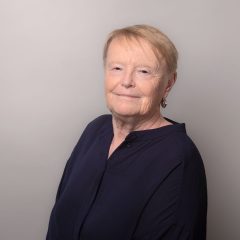 Claudia Mitchell is a Distinguished James McGill Professor in the Faculty of Education, McGill University and an Honorary Professor at the University of KwaZulu-Natal, South Africa. At McGill she is the director of the Institute for Human Development and Well-being and the founder and director of the Participatory Cultures Lab. She is also the co-founder and Editor-in-Chief of the award-winning journal Girlhood Studies: An Interdisciplinary Journal. Her research focuses on participatory visual and arts-based approaches to working with young people and communities in relation to addressing critical social issues such as gender equality and gender-based violence and in a wide range of country contexts in West Africa, Southern and Eastern Africa, East Asia Pacific, and India. She currently leads several large funded projects focusing on girl-led ‘from the ground up’ policy making to address sexual violence with Indigenous girls in Canada and South Africa.
Claudia Mitchell is a Distinguished James McGill Professor in the Faculty of Education, McGill University and an Honorary Professor at the University of KwaZulu-Natal, South Africa. At McGill she is the director of the Institute for Human Development and Well-being and the founder and director of the Participatory Cultures Lab. She is also the co-founder and Editor-in-Chief of the award-winning journal Girlhood Studies: An Interdisciplinary Journal. Her research focuses on participatory visual and arts-based approaches to working with young people and communities in relation to addressing critical social issues such as gender equality and gender-based violence and in a wide range of country contexts in West Africa, Southern and Eastern Africa, East Asia Pacific, and India. She currently leads several large funded projects focusing on girl-led ‘from the ground up’ policy making to address sexual violence with Indigenous girls in Canada and South Africa.
Mitchell’s publications include: Doing visual research; Participatory visual methodologies: Social change, community and policy [Mitchell, DeLange, Moletsane]; Disrupting shameful legacies: Girls and young women speaking back through the arts to address sexual violence [Mitchell & Moletsane]; Visual encounters in the study of rural childhoods [Mandrona & Mitchell]. Participatory visual methodologies in global public health [Mitchell & Sommer]; Handbook on participatory video [Milne, Mitchell & DeLange] Picturing research: Drawing as visual methodology [Theron, Mitchell, Smith & Stuart].
Email: claudia.mitchell@mcgill.ca
Bonnie Brayton
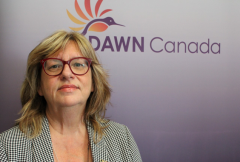 A recognized leader in both the feminist and disability movements, Bonnie Brayton has been the National Executive Director of the DisAbled Women’s Network (DAWN) Canada since May 2007. In this role, she has proven herself as a formidable advocate for women with disabilities here in Canada and internationally. During her tenure with DAWN Canada, Ms. Brayton has worked diligently to highlight key issues that impact the lives of women and girls with disabilities.
A recognized leader in both the feminist and disability movements, Bonnie Brayton has been the National Executive Director of the DisAbled Women’s Network (DAWN) Canada since May 2007. In this role, she has proven herself as a formidable advocate for women with disabilities here in Canada and internationally. During her tenure with DAWN Canada, Ms. Brayton has worked diligently to highlight key issues that impact the lives of women and girls with disabilities.
From 2016 to 2019, Ms. Brayton served as a member of Minister’s Advisory Council on Gender-Based Violence(WAGE) and was reappointed to a two-year term. Earlier in 2020, Bonnie was appointed by The Honourable Carla Qualtrough to Covid-19 Disability Advisory Group (CDAG) and will continue to serve as part of the DAG. Bonnie was also appointed to be part of Gender and Trade Advisory Group.
Ms. Brayton lives in Montreal with her partner Delmar Medford. She has two adult daughters, Leah and Virginia.
Email: admin@dawncanada.net
Asha Hans
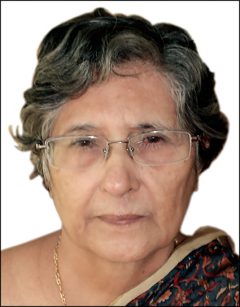 Asha Hans is a Political Scientist having taught at the Dept of Political Science and Chaired the School of Women’s Studies Utkal University. She is the is Executive Vice President Shanta Memorial Rehabilitation Centre. Asha Hans is recent Member Funding Board United Nations Women’s Peace Humanitarian Fund, Member Board Women Enabled International Washington. She is founder advisor Women with Disabilities Indian Network. As an academic she has done gender work on disability her well known books are Gender and the Trajectories of Power in English (2015) and Japanese (2020); as co editor of the Social Development Report 2016: Disability Rights Perspective and Women Disability and Identity (2003). For the Government of India she has written the Guidelines on Disability Inclusive Disaster Risk Reduction. As a Fulbright scholar she worked in Columbia University and the American State University. As Kathleen Ptolemy Fellow she worked at York University Canada
Asha Hans is a Political Scientist having taught at the Dept of Political Science and Chaired the School of Women’s Studies Utkal University. She is the is Executive Vice President Shanta Memorial Rehabilitation Centre. Asha Hans is recent Member Funding Board United Nations Women’s Peace Humanitarian Fund, Member Board Women Enabled International Washington. She is founder advisor Women with Disabilities Indian Network. As an academic she has done gender work on disability her well known books are Gender and the Trajectories of Power in English (2015) and Japanese (2020); as co editor of the Social Development Report 2016: Disability Rights Perspective and Women Disability and Identity (2003). For the Government of India she has written the Guidelines on Disability Inclusive Disaster Risk Reduction. As a Fulbright scholar she worked in Columbia University and the American State University. As Kathleen Ptolemy Fellow she worked at York University Canada
Email: ashahans10@gmail.com
Reena Mohanty
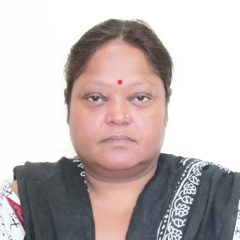
Reena is currently acting as the Course Coordinator for the course under IGNOU and Bangalore University.
Reena won a National Award in 2009 for the Best Individual for outstanding work for persons with disabilities. This award was felicitated by the Governor for her outstanding work for women with disabilities. She also voluntarily helped in the administration and account management of the Chitta Project run by the Centre of Women’s Studies, Utkal University sponsored by UNESCO.
Jace Nair
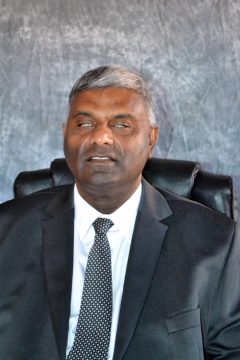 Jace Nair is the CEO of Blind SA. Headquartered in Johannesburg, Blind SA has had a significant influence in advocating the rights of the blind throughout South Africa. Besides his current role, Jace took on several notable positions in the past, like National Executive Director of SA National Council for the Blind, Secretary of SA Disability Alliance, President of African Union of the Blind, and Africa Representative of WBU.
Jace Nair is the CEO of Blind SA. Headquartered in Johannesburg, Blind SA has had a significant influence in advocating the rights of the blind throughout South Africa. Besides his current role, Jace took on several notable positions in the past, like National Executive Director of SA National Council for the Blind, Secretary of SA Disability Alliance, President of African Union of the Blind, and Africa Representative of WBU.
Jace has had extensive experience heading several organizations in the region. He is currently the chairperson of the Africa Marrakesh Treaty Committee and SA Copyright Coalition-Right to Read Campaign. He is also a representative of the WBU Marrakesh Treaty Committee and an active member of the Presidential Working Group on Disability. Alongside these positions, Jace has participated in WIPO SCCR (since 2009), the Treaty negotiations adopted in Morocco (2013), the 6th Africa Forum in Kampala (2015), the ARIPO workshops on the Marrakesh Treaty in Harare (2014), Maseru (2015), and Gaborone (2016), as well as the African Commission on Human and People’s Rights in Banjul (2015), the AU Council of Ministers in Dakar (2015), and the Pan African Parliament (2016).
Email: ceo@blindsa.org.za
Huyen Thi Do
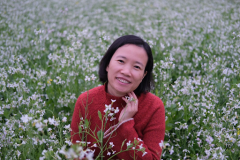 Huyen has been working as Country Representative for Abilis Foundation, a development fund from Finland, that aims at empowerment and contributes toward equal life and opportunities for persons with disabilities in society through human rights, independent living, and economic empowerment, primarily in developing countries, including Vietnam. She has also devoted her time as Vice-Chair of the Hanoi Association of persons with disabilities (DP Hanoi) and is Chairwoman of Bac Tu Liem organization of persons with disabilities, under DP Hanoi.
Huyen has been working as Country Representative for Abilis Foundation, a development fund from Finland, that aims at empowerment and contributes toward equal life and opportunities for persons with disabilities in society through human rights, independent living, and economic empowerment, primarily in developing countries, including Vietnam. She has also devoted her time as Vice-Chair of the Hanoi Association of persons with disabilities (DP Hanoi) and is Chairwoman of Bac Tu Liem organization of persons with disabilities, under DP Hanoi.
Having had nearly 20 years of experience working on issues related to disability justice and community development, she has gained extensive experience of complex development in different areas, mostly linked to social change processes, civil society capacity development, and democracy and human rights progress. She has also engaged in organizational analysis, organizational coaching and mentoring and results/rights-based management support. Her interests lie in fields of sustainable development of non-profit organizations, civil society, and human rights with focus on inclusion and empowerment for persons with disabilities.
She received B.A in Economics from Hanoi University of Finance and Accountancy and MA in Economics from Academy of Finance in Vietnam. She held her MA in International Development and Social Change from Clark University in the USA as a recipient of the International Fellowship Program from Ford Foundation.
In her spare time, she enjoys reading novels and listening to music. She loves travelling as well.
Email: dothihuyen76@gmail.com
Duy Van Nguyen
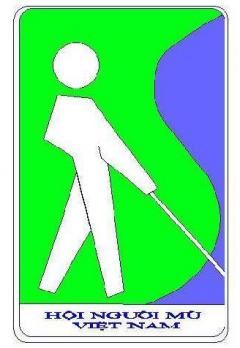
A Luoi Blind Association
Founded in 2002, A Luoi Blind Association, is one of the key representatives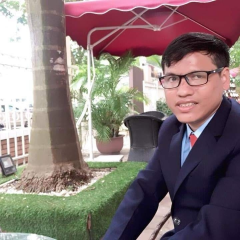 of organizations of disadvantaged groups in A Luoi. They have established 19 community-level organizational members with 340 individuals. The objective is to support and protect the rights of people with disabilities and cooperate with other organizations to promote the inclusion for people with disabilities in term of education, employment and participation in the community.
of organizations of disadvantaged groups in A Luoi. They have established 19 community-level organizational members with 340 individuals. The objective is to support and protect the rights of people with disabilities and cooperate with other organizations to promote the inclusion for people with disabilities in term of education, employment and participation in the community.
Mr. Duy Van Nguyen has been working as a President of A Luoi Blind Association for 10 years. He collaborated with some international projects including Transforming Disability Knowledge, Research and Activism (TDKRA) to improve the local capacity of people with disabilities and their organizations. Also, he directly managed and coordinated a number of programs and activities related house construction and repairment, loans and vocational training programs associated with job creation for members.
Email: hnmaluoi2014@gmail.com
Phuong Huynh
 Dr. Phuong Huynh works as a senior lecturer and a researcher. She is also the head of the Social Work Department, Faculty of Sociology and Social Work at Hue University of Sciences, Hue University, Vietnam. She received her PhD degree on Gender and Development Studies from Asian Institute of Technology (AIT), Thailand in 2014.
Dr. Phuong Huynh works as a senior lecturer and a researcher. She is also the head of the Social Work Department, Faculty of Sociology and Social Work at Hue University of Sciences, Hue University, Vietnam. She received her PhD degree on Gender and Development Studies from Asian Institute of Technology (AIT), Thailand in 2014.
Her research interests include vulnerability and adaptation, social policy, social inclusion and gender. She has a number of publications in vulnerability and adaptation of rural livelihoods to climate change at national and international journals.
Email: phuonghuynh@husc.edu.vn or htaphuong@hueuni.edu.vn
Hoang-Yen Thi Vo
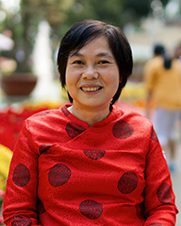 Dr. Hoang-Yen Thi Vo is a tireless activist for the rights of people with disabilities in Vietnam, a social worker and disability educator for colleges, GOs, and NGOs with projects or programs on disability, and consultant for several disability-related community programs.
Dr. Hoang-Yen Thi Vo is a tireless activist for the rights of people with disabilities in Vietnam, a social worker and disability educator for colleges, GOs, and NGOs with projects or programs on disability, and consultant for several disability-related community programs.
In 2005, Yen founded the Disability Research and Capacity Development (DRD) Center based in Ho Chi Minh City to transform her community and empower people with disabilities to fulfill their education and employment goals. Under her direction, DRD later expanded its network to include 35 organizations in southern Vietnam, providing an array of services to thousands of individuals annually. In addition to her work at DRD, Yen serves as the Vice President of the Vietnam Federation on Disability.
Yen was named one of Forbes Vietnam’s ‘50 Most Influential Women’ in 2019. She has received several prestigious awards and accolades over the years for developing life-changing resources for people with disabilities, such as the Ramon Magsaysay Award (known as the Asian Nobel Prize), Australia Leadership Award, the U.S. President’s Call to Service Award, and the Kazuo Itoga Prize.
Email: yenvo@drdvietnam.org
Katie Aubrecht
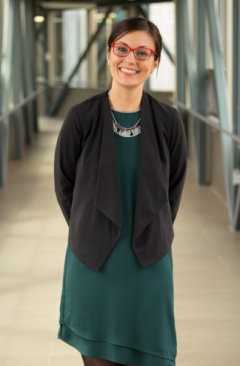 Katie Aubrecht, PhD, she/her, joins the project from Mi’kmaki, the unceded, traditional and ancestral territory of the L’nu People. Aubrecht is Canada Research Chair Tier II Health Equity and Social Justice and Assistant Professor in the Department of Sociology at St. Francis Xavier University, Antigonish, Nova Scotia, where she supervises students and teaches courses in the areas of mental health and society, disability and culture, race and identity, social theory, and social policy. Aubrecht’s research program, informed by sociology and disability studies, uses participatory and intersectional approaches and qualitative research methods to map and analyze marginalization, mental health and resilience across the life span as social justice issues. The overall purpose of this research is to generate new knowledge to enhance the care and self-perceived mental health and wellness of diverse people in rural communities. This program is supported by the Spatializing Care Lab, a participatory arts-informed health research and training infrastructure that bridges medical, social, and cultural approaches to care.
Katie Aubrecht, PhD, she/her, joins the project from Mi’kmaki, the unceded, traditional and ancestral territory of the L’nu People. Aubrecht is Canada Research Chair Tier II Health Equity and Social Justice and Assistant Professor in the Department of Sociology at St. Francis Xavier University, Antigonish, Nova Scotia, where she supervises students and teaches courses in the areas of mental health and society, disability and culture, race and identity, social theory, and social policy. Aubrecht’s research program, informed by sociology and disability studies, uses participatory and intersectional approaches and qualitative research methods to map and analyze marginalization, mental health and resilience across the life span as social justice issues. The overall purpose of this research is to generate new knowledge to enhance the care and self-perceived mental health and wellness of diverse people in rural communities. This program is supported by the Spatializing Care Lab, a participatory arts-informed health research and training infrastructure that bridges medical, social, and cultural approaches to care.
Additional information is available at www.mystfx.ca/carelab
Email: caubrech@stfx.ca
Karen Soldatic
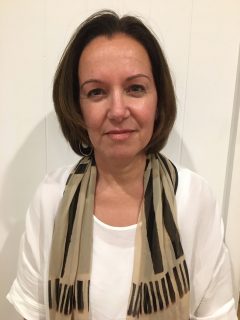 Karen Soldatic, Associate Professor, School of Social Sciences & Institute Fellow, Institute for Culture and Society, Western Sydney University. She is a sociologist of inequality and coloniality, explicitly working at the intersectionality of disability, gender and sexuality, race and ethnicity and, Indigeneity for disabled people within the Global South. Her research builds on her 20 years of experience as an international (Cambodia, Sri Lanka, Indonesia), national and state-based senior policy analyst, researcher and educator. She obtained her PhD (Distinction) in 2010 from the University of Western Australia.
Karen Soldatic, Associate Professor, School of Social Sciences & Institute Fellow, Institute for Culture and Society, Western Sydney University. She is a sociologist of inequality and coloniality, explicitly working at the intersectionality of disability, gender and sexuality, race and ethnicity and, Indigeneity for disabled people within the Global South. Her research builds on her 20 years of experience as an international (Cambodia, Sri Lanka, Indonesia), national and state-based senior policy analyst, researcher and educator. She obtained her PhD (Distinction) in 2010 from the University of Western Australia.
Please find Karen’s two latest articles and books here:
https://www.cogitatiopress.com/socialinclusion/article/view/4280/4280
https://journals.library.brocku.ca/index.php/SSJ/article/view/2259
Email: K.Soldatic@westernsydney.edu.au
Nilika Mehrotra
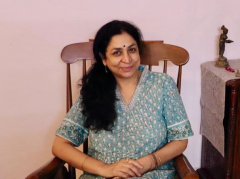 Nilika Mehrotra is a social anthropologist teaching at the Centre for the Study of Social Systems, JawaharLal Nehru University, New Delhi, India. She is editor of the Journal Indian Anthropologist. She has been a Fulbright Senior Researcher at University of California, Berkeley, USA ( 2013-2014). She has edited the book Disability Studies in India: Interdisciplinary Perspectives (Springer, 2020) besides contributing numerous research publications in the areas of Gender, disability and Development studies.
Nilika Mehrotra is a social anthropologist teaching at the Centre for the Study of Social Systems, JawaharLal Nehru University, New Delhi, India. She is editor of the Journal Indian Anthropologist. She has been a Fulbright Senior Researcher at University of California, Berkeley, USA ( 2013-2014). She has edited the book Disability Studies in India: Interdisciplinary Perspectives (Springer, 2020) besides contributing numerous research publications in the areas of Gender, disability and Development studies.
Email: nilikam@gmail.com
Hannah Dyer
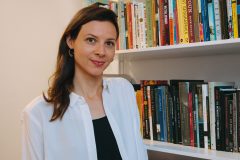 Dr. Hannah Dyer is an Associate Professor in the Department of Child & Youth Studies at Brock University. She is a critical theorist of childhood with concentration in art/aesthetics, critical theory, queer theory, and psychoanalysis. She is interested in how aesthetic and expressive cultures of childhood reframe relationships to political crises, historical traumas, sexuality, racialization, and social debates about belonging. She is the author of The Queer Aesthetics of Childhood: Asymmetries of Innocence and the Cultural Politics of Child Development (Rutgers University Press, 2020).
Dr. Hannah Dyer is an Associate Professor in the Department of Child & Youth Studies at Brock University. She is a critical theorist of childhood with concentration in art/aesthetics, critical theory, queer theory, and psychoanalysis. She is interested in how aesthetic and expressive cultures of childhood reframe relationships to political crises, historical traumas, sexuality, racialization, and social debates about belonging. She is the author of The Queer Aesthetics of Childhood: Asymmetries of Innocence and the Cultural Politics of Child Development (Rutgers University Press, 2020).
Email: hdyer@brocku.ca
Eda Yeşilkaya Bennett
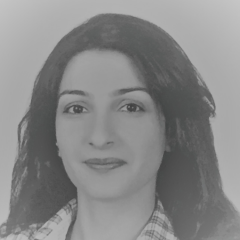 Eda Yeşilkaya Bennett (she/her), PhD, is an assistant professor in the Department of Special Education, Gazi University, in Turkey, with experience conducting research in the UK. She supervises students and teaches courses in the areas of special education, teacher training, scientific research methods, and ethics. Her research focuses on children, young people who have special educational needs, their families and related stakeholders with the aim to develop training and support programmes to create a positive change in perspectives in the field of disability studies. She also works on developing practical strategies and theoretical approaches to empower children and youths with disabilities, creating positive changes in their lives through their active participation in decision-making processes.
Eda Yeşilkaya Bennett (she/her), PhD, is an assistant professor in the Department of Special Education, Gazi University, in Turkey, with experience conducting research in the UK. She supervises students and teaches courses in the areas of special education, teacher training, scientific research methods, and ethics. Her research focuses on children, young people who have special educational needs, their families and related stakeholders with the aim to develop training and support programmes to create a positive change in perspectives in the field of disability studies. She also works on developing practical strategies and theoretical approaches to empower children and youths with disabilities, creating positive changes in their lives through their active participation in decision-making processes.
Additional information is available at https://avesis.gazi.edu.tr/10942/publications , edayesilkaya@gazi.edu.tr
Email: eyesilkaya01@qub.ac.uk
Kanitha Nhek
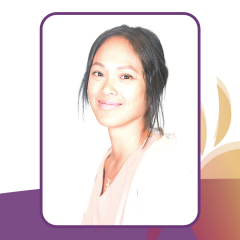 Kanitha joined DAWN Canada in 2020 as the Community Outreach Coordinator, and in July 2021 became the Director of Outreach and Partnerships. In her new role, she works closely with national and international organizations to grow and nurture DAWN’s network.
Kanitha joined DAWN Canada in 2020 as the Community Outreach Coordinator, and in July 2021 became the Director of Outreach and Partnerships. In her new role, she works closely with national and international organizations to grow and nurture DAWN’s network.
Kanitha has more than ten years of experience in marketing, communications, major events and project management in Canada, France, and her native home of Cambodia. The driving force behind her work is the desire to create an inclusive community for marginalized groups, in particular women and girls with disabilities – the most underserved population in the world.
Outside of work, Kanitha sits on the Board of Directors of VIDA SANA and plans activities and events for the Centre Khemara. In her down time, she loves hiking, reading a good book, crafting, and most of all hanging out with her cat Baloo.
Email: kanitha@dawncanada.net
Dana Corfield
 Dana Corfield is a PhD candidate in Critical Disability Studies at York University. She is also the founder and director of Equip KIDS International – a grassroots organization focused on supporting and empowering children with disabilities and their families in Peru. With over 20 years of experience working with children, families, community groups and state actors in Latin America, she has developed many deep relationships in the area. Her academic work aims to centre and highlight the perspectives and lived experiences of children with disabilities (and their families) in the Global South, and to create tighter connections between these and academic discourse and activist circles. Areas of interest therefore include transnational feminist and decolonial disability studies, critical development studies, social movements, social policy and political economy.
Dana Corfield is a PhD candidate in Critical Disability Studies at York University. She is also the founder and director of Equip KIDS International – a grassroots organization focused on supporting and empowering children with disabilities and their families in Peru. With over 20 years of experience working with children, families, community groups and state actors in Latin America, she has developed many deep relationships in the area. Her academic work aims to centre and highlight the perspectives and lived experiences of children with disabilities (and their families) in the Global South, and to create tighter connections between these and academic discourse and activist circles. Areas of interest therefore include transnational feminist and decolonial disability studies, critical development studies, social movements, social policy and political economy.
Email: danacorfield@cunet.carleton.ca
Linh Dang

Linh is currently a MA student in Applied Disability Studies specializing in Leadership, Diversity, Community and Culture at Brock University.
Being a youth with disabilities in Vietnam, since 2017, Linh has engaged in the Transforming Disability Knowledge, Research and Activism (TDKRA) project, funded by the Social Sciences and Research Council of Canada (SSHRC) (TDKRA’s website, n.d.) as a way of building her knowledge and self-empowerment.An outcome of her professional work can be demonstrated in two published articles with the Canadian Journal of Children’s Rights (Dang, 2019) and Agenda (Nguyen, Dang & Mitchell, 2021) where she sought to emphasize the importance of engaging with the voices of the girls and women in the global South.As a research assistant with the ENGAGE project, she is also interested in learning how Decolonial Disability Studies approach to disability leadership to strengthen the collective engagement and activism of young women and girls with disabilities from global South.
She can be reached by email at: LinhDang@cunet.carleton.ca
Publications:
Dang, T. L. (2019). Empowerment Through Participation in Vietnam: A Personal Experience of Taking Back the Pride of Disability. Canadian Journal on Children’s Rights. 6(1), pp. 213-226. Available at nhttps://ojs.library.carleton.ca/index.php/cjcr/article/view/2238
Hoa Bui
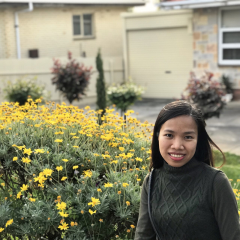 Hoa Bui is currently an independent researcher in gender and disability issues in the context of Viet Nam. She has carried out some research on transgender person’s representations on Vietnamese online media, sexual harassment, gender-based violence against women and girls, including those with disabilities and sexual minorities. She has been researching gender-based violence against women and girls with disabilities in the context of COVID-19 in Nam Dinh province of Vietnam.
Hoa Bui is currently an independent researcher in gender and disability issues in the context of Viet Nam. She has carried out some research on transgender person’s representations on Vietnamese online media, sexual harassment, gender-based violence against women and girls, including those with disabilities and sexual minorities. She has been researching gender-based violence against women and girls with disabilities in the context of COVID-19 in Nam Dinh province of Vietnam.
She has over ten years working in the Center for Studies and Applied Sciences in Gender – Family – Women and Adolescents, a local NGO in Vietnam for women and girls who are survivors of domestic violence, human trafficking and gender and sexuality-based violence. She played a prominent role in the counselling section for survivors; as a facilitator in the training courses on counselling on domestic violence/violence against women, sexuality and gender diversity.
In 2016 she was awarded an Australia Awards Scholarship by the Australian Government. She holds an MA in Gender and Women Studies from the Flinders University of South Australia. She envisions herself as a gender and disability specialist.
Email: hoa.pbc.2208@gmail.com
Nhi Truong
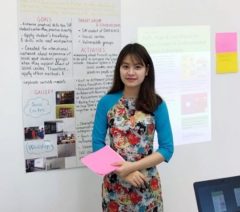 Nhi Truong (she/her) is a lecturer at the University of Science, Hue University (Vietnam). She earned a master’s degree in social work in 2022 from the University of Science, Hue University with a research topic related to the access to education of children with disabilities. Her primary area of interest is social work with children, especially those with disabilities. Through participation in projects and professional training programs, she has developed significant expertise in communication and interaction competencies, mental health, etc. She has also worked in educational and community settings as a social worker.
Nhi Truong (she/her) is a lecturer at the University of Science, Hue University (Vietnam). She earned a master’s degree in social work in 2022 from the University of Science, Hue University with a research topic related to the access to education of children with disabilities. Her primary area of interest is social work with children, especially those with disabilities. Through participation in projects and professional training programs, she has developed significant expertise in communication and interaction competencies, mental health, etc. She has also worked in educational and community settings as a social worker.
Email: nhitruong@cunet.carleton.ca
Phuong Mai Anh Tran
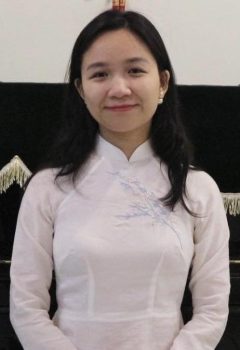 Phuong Mai Anh Tran is a Ph.D. candidate at the School of International Development and Global Studies at the University of Ottawa, Canada. Her primary research interests encompass aid in education, equity in education, international education, and decolonial studies, with a particular focus on East Asia and Southeast Asia. She is keen to explore the accessibility of learning opportunities for girls and women with disabilities and young adults from non-elite backgrounds in the global South. Phuong’s doctoral research investigates the role of international scholarships for higher education as Official Development Assistance, examining them through the perspectives of soft power, international development, and educational equity, especially since the integration of such scholarships into SDG4b in 2015. She holds a Master of Arts degree from the School of Government at Victoria University of Wellington and a Bachelor of Arts degree from the Diplomatic Academy of Vietnam. In 2014, Phuong volunteered at the Maison Baldwin House in Cornwall, providing assistance to women and children transitioning from violent and abusive situations to safe and secure environments. Her professional experience includes consultancy roles for the ASEAN Foundation and the UNESCO Global Education Monitoring Report.
Phuong Mai Anh Tran is a Ph.D. candidate at the School of International Development and Global Studies at the University of Ottawa, Canada. Her primary research interests encompass aid in education, equity in education, international education, and decolonial studies, with a particular focus on East Asia and Southeast Asia. She is keen to explore the accessibility of learning opportunities for girls and women with disabilities and young adults from non-elite backgrounds in the global South. Phuong’s doctoral research investigates the role of international scholarships for higher education as Official Development Assistance, examining them through the perspectives of soft power, international development, and educational equity, especially since the integration of such scholarships into SDG4b in 2015. She holds a Master of Arts degree from the School of Government at Victoria University of Wellington and a Bachelor of Arts degree from the Diplomatic Academy of Vietnam. In 2014, Phuong volunteered at the Maison Baldwin House in Cornwall, providing assistance to women and children transitioning from violent and abusive situations to safe and secure environments. Her professional experience includes consultancy roles for the ASEAN Foundation and the UNESCO Global Education Monitoring Report.
Email: maianhphuongtran@cunet.carleton.ca
